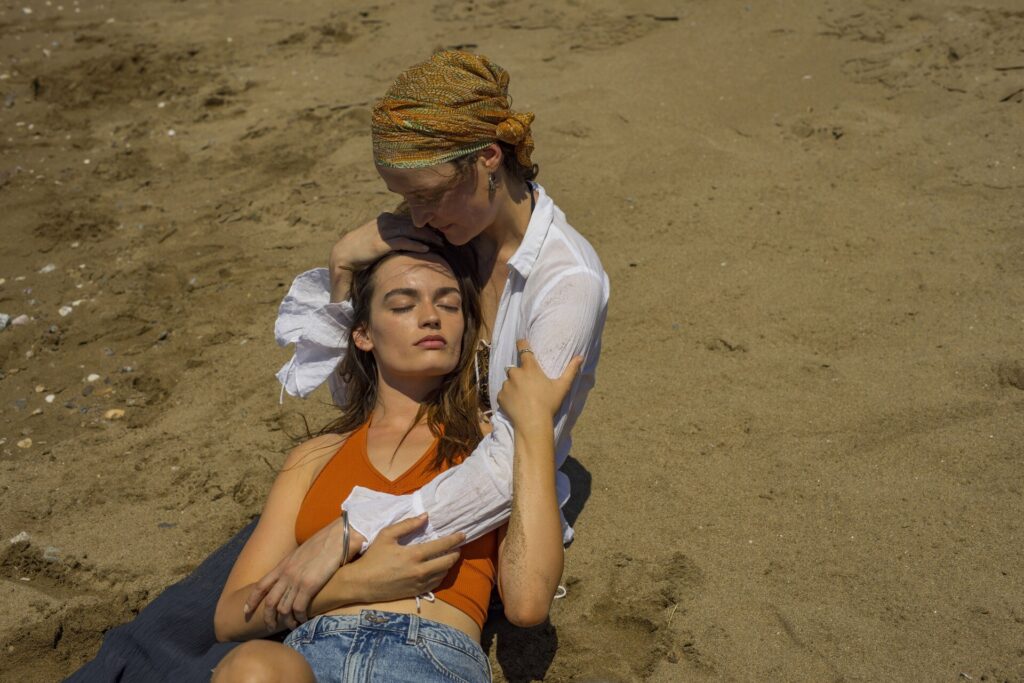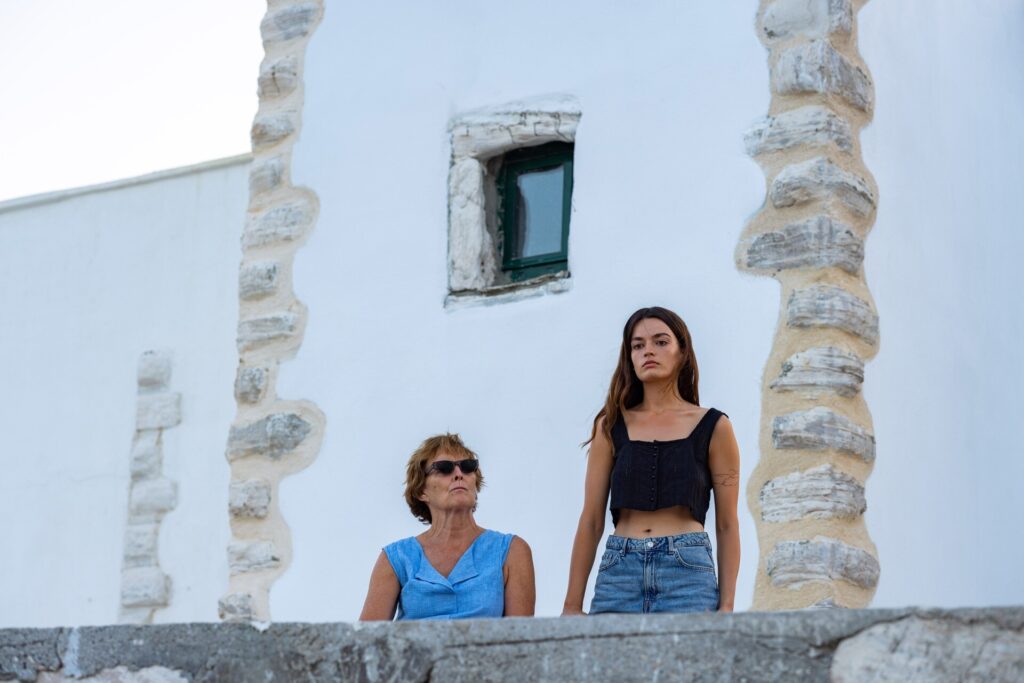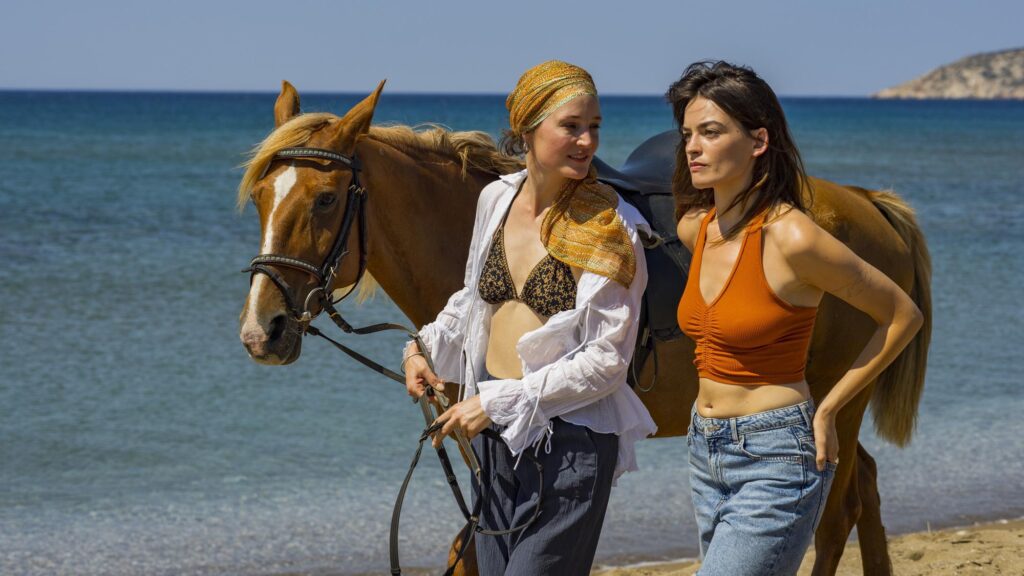Director: Rebeca Lenkiewicz
Writer: Deborah Levy
Stars: Emma Mackey, Vicky Krieps, Fiona Shaw
Synopsis: With a strange illness, a mother and her daughter embark on a journey to the Spanish coast to find a cure, and along the way the daughter discovers another reality far from her controlling mother.
In 2016, British playwright and novelist Deborah Levy made headlines after publishing ‘Hot Milk’, a novel that garnered her comparisons to Virginia Woolf because of the vividness with which Levy created the various character dynamics that occur in the narrative. She was already recognized by book-readers for her work ‘Swimming Home’, by being shortlisted for the Booker Prize in 2012. But ‘Hot Milk’ placed her on a new pedestal writing-wise. It put her in a zone, not to her comfort, and she excelled, as readers rave about her work since then. Similarly, and in some aspects unfortunately the opposite, the same thing has happened to screenwriter Rebecca Lenkiewicz. Known for writing the screenplays for Ida (Pawel Pawlikowski), Disobedience (Sebastian Lelio), and She Said (Maria Schrader), all stories about women set in different times and focusing on varying dynamics, Lenkiewicz is tasked with adapting Deborah Levy’s aforementioned work, ‘Hot Milk’ (screening in competition at the 2025 Berlin International Film Festival).
It seems like a shoo-in when you consider the novel’s themes (female rage, sexuality, solitude, and fractured relationships) and its play in character dynamics and bonds. Successfully adapting this novel will put her on another pedestal, like how ‘Hot Milk’ raised Levy’s literary profile. The main reason is that this is the first time Lenkiewicz is in the director’s chair. Previously, she has been a storyteller but neverin charge of the whole boat. Where Levy and Lenkiewicz differ in terms of the result of their portrayals is that the latter does not develop convincing character relations. Lenkiewicz’s Hot Milk comes off as rather unbelievable and flimsy. The use of deceptive realism, which Ledy utilizes in her novel during the first chapters, does add some intrigue. But it does not evolve into a similarly dense, yet substantial, piece of work.
Hot Milk follows a different set of pairings but primarily centers around Sofia (Emma Mackey) and her ailing, wheelchair-bound mother, Rose (Fiona Shaw), as they arrive in Almeria, a seaside town in Southwest Spain, during the heart of the summer. From the moment Lenkeiwicz introduces Sofai and Rose to us, you have already noticed that their mother-daughter relationship has more than a few expected cracks. This pattern of the audience being one step ahead and knowing the state of the different dynamics occurs throughout the entirety of Hot Milk. Although this initial one between Sofia and Rose has to be evident in order to dissect their mental states and reasons for being, some foibles in Lenkeiwicz’s adaptation make it one note.
Rose is overbearing, demanding her daughter accompany her to find an experimental healer, Dr. Gomez (Vincent Perez, who is poorly cast and adopts a terrible accent), who has an expensive treatment that can potentially cure her undiagnosed ailment. She claims that her “bone condition” prevents her to walk, even though Rose does so on random occasions throughout the year, as Sofia describes angrily at this confusing real or fake health situation. Sofia is full of doubts, yet she helped mortgage their house to pay for this trip that will potentially help her mother. The viewer also questions the conveniences of her condition, including the stoic metaphor that Lenkeiwicz constructs along the way. Does Sofia actually want to help Rose? Is all of this just an act induced by a traumatic experience? Why is Rose so harsh to Sofia, even if she does all these favors for her?
This condition began once Sofia’s father, Christos, left the family for a life of new faith in Athens, living with his new, younger wife and child. The abandonment caused their world to move out of sync. Hence, Rose and Sofia are in this tricky situation. Once arriving at Almeira, the two occasionally take distance from each other to take a breather and heal their broken souls, apart from the corroding bond they share. As Rose goes along with Dr. Perez’s treatment, trying to understand Christo’s decision to leave, Sofia meets and begins an affair with a German traveler, Ingrid (Vicky Krieps, whom I’m always glad to see on-screen). Sofia and Ingrid meet on the beach, the latter appearing on the scene via horseback, a magical entrance that seems quite fairytale-esque. Her entrance adds a layer of grounded mysticality, enhanced by the imagery of the sun-soaked beaches and streets that cinematographer Christopher Blauvelt captures.
The encounter awakens something in Sofia, a new experience in her young, detained life. Emma Mackey’s performance, which Lenkiewicz relies on to move the emotional, contemplative needle, helps express this inner emotion that has been kept hidden for years, mainly via the British actress’ facial expressions and mannerisms. Her expressions are flawless, as she conveys yearning, solitude, and rage built from the familiar separation via the most minute details. She does everything that Lenkiewicz prompts and asks. The problem is that Lenkiewicz fails her in one key thing: the scenes in which Sofia and Rose are apart from each other do not reveal enough details about their personalities or about why their relationship is this broken or acidic, to which neither Mackey nor Shaw can tap into with their performances, no matter how hard they try.
Key details hint at the roots of Sofia and Rose’s fracture and brooding. There are not a lot of them, but there sure are revelations of how Sofia feels about being stripped of her role as a daughter (and independence) to become a surrogate for her mother’s pain. However, the scenes meant for their independent healing journeys never show another side of them amidst the encounters with these strangers they are slowly connecting with, whether Ingrid or Dr. Perez. Hot Milk focuses so much on these suffering souls’ disdain and angst that it leaves room for reconciliation and emotional fervor, which Levy does in the latter half of the novel. Neither the couples, mother-daughter, or doctor-patient convince you since they lack tenderness and vividness.
Lenkiewicz adds notches for ‘The Lost Daughter’–a novel Elena Ferrante wrote and Maggie Gyllenhaal adapted in 2021–and The Five Devils (a 2023 French film directed by Léa Mysius) into her adaptation of Hot Milk, primarily by their cold, distanced yet emotionally tangible stories about women–mothers on the brink of significant change in particular. Rebecca Lenkiewickz is not close to being Ferrante in writing, although she can be compared to Mysius. So, you can’t expect the poetic, pensive, and highly detailed portrait of broken human connections that Ferrante provides in her books. What Lenkiewicz succeeds in doing, as demonstrated in Ida and the rest of her screenplays, is showing elegance through her writings about identity and the unearthing of the past’s secrets. However, that is what Hot Milk lacks. And what you see instead is a lesser version of what she has done before, without the poise or a defined emotional core. In the end, Hot Milk ends up as a missed opportunity–one that fails to tap into the emotional depth or nuance of the source material, leaving a hollow, unfulfilled version of a complex story.








